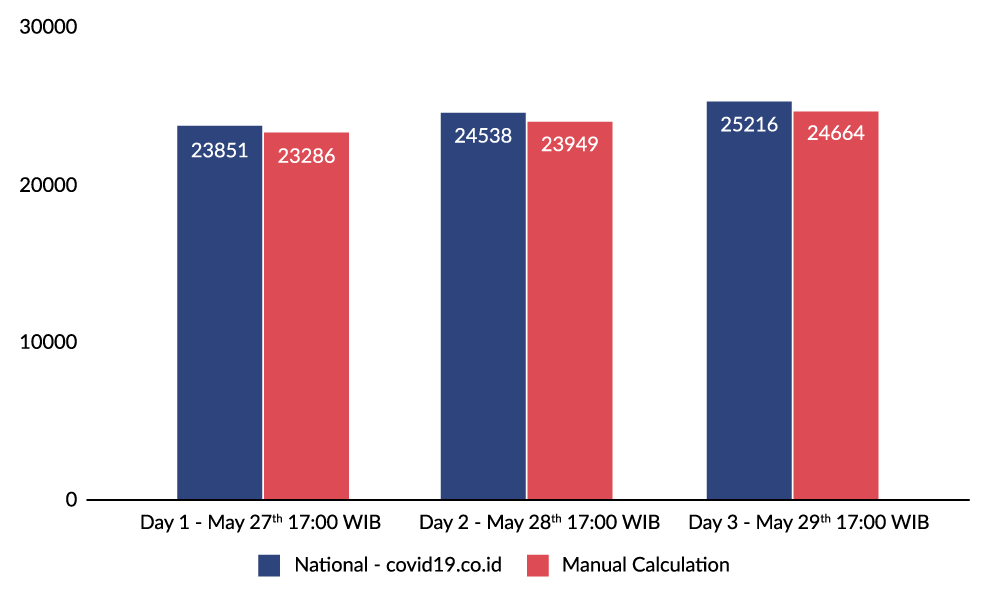



All Blog Early Lessons from the COVID-19 Pandemic for Indonesia's One Data Policy
Around the world, countries are struggling to address COVID-19 pandemic. And Indonesia is no exception. Governments are under the spotlight to both contain the virus spread and manage the immense economic and social impact on the public. Conditions change within hours or even minutes, demanding rapid and active adaptation of the government’s decision making. Good data should help inform good decision making, and this pandemic has raised critical issues on collecting and integrating the data from various government bodies.
Indonesia’s One Data Policy is regulated under Presidential Decree Number 39/2019. It calls for data collection, management, and utilisation processes to be integrated, accurate, accessible, and multipurpose. In doing so, the Government is expecting data to support planning, implementation, evaluation, and control over the development agenda.
Initially, coordination response of COVID-19 was led by an ad hoc task force, Gugus Tugas Percepatan Penanganan COVID-19. Due to the scale of this pandemic, President Joko Widodo took a stronger measure to tackle both the health crisis and economic impact. On 20 July 2020, the task force was officially replaced by Satuan Tugas Penanganan COVID-19, as part of the COVID-19 Handling and National Economic Recovery Committee. Despite the government efforts to consolidate the pandemic response, horizontal coordination between ministries and government bodies, as well as vertical coordination between central and local authorities, could be better improved.
Between April and July 2020, Saraswati, with support from DFAT-funded SIAP SIAGA program, conducted a “Needs Analysis on Harnessing Data to Support Disaster Management in Indonesia”. Focusing on the current pandemic response, this needs analysis identifies challenges in effective data coordination, quality data collection and robust institutional links to enable multi-stakeholders collaboration—that hamper quick and accurate decision making in events of disaster. More importantly, this research identified gaps between ideal One Data Policy implementation against the current situation.
Our findings highlighted the existence of multiple data platforms managed by different ministries. One example relates to the integrated data platform developed by the task force called Bersatu Lawan COVID-19 and the Ministry of Health’s data platform, All Record. While offering similar functions, healthcare professionals were initially tasked to input data to both platforms. Considering their highly demanding job commitments in managing the virus, this multiple reporting responsibility could risk both time and resource inefficiencies. At the subnational level, government data are dispersed across different public agencies. The process of collecting COVID-19 related data requires separate requests to the Dinas Kesehatan for health/patient data, Dinas Perhubungan for travel data, and Dinas Tenaga Kerja for workforce data.
Data management from the provincial up to the national level is another matter. The absence of clear instructions regarding reporting and data updates, resulting in asynchronous data. Highlighting the issue of discrepancy between central and local government data, Saraswati conducted a three-day data tracking experiment. Between 27 and 29 May, we compiled data on COVID-19 positive cases from all 34 provincial government websites as well as the national data portal, covid19.go.id. Our data tracking experiment shows that the number of positive cases published on the national data platform differs from the manual calculation of all provincial data. One possible reason is the different data upload time between the provincial and national website.

Number of COVID-19 positive cases: GTPPC19 vs manual calculation
Data management has been a long-standing challenge in Indonesia, specifically on disaster-related data. Key data sets are often spread among different ministries. The government is at risk of losing essential data as well as hindering further research and analysis from supporting disaster preparedness.
Such challenges are mainly caused by the absence of data architecture and management, which ideal implementation of the One Data Policy would address. The One Data Policy mandates the National Development Planning Agency (Bappenas) to establish data architecture while the Ministry of Communication and Information (Kemkominfo) is responsible for the technology. Both agencies play an important role in distributing data responsibilities and developing the government data exchange platform, respectively. Nonetheless, the responsibility for accelerating and implementing the One Data Policy does not only lie with Bappenas and Kemkominfo. Bappenas has delegated the responsibility of standardising inter-ministry data to Statistics Indonesia (BPS), Geospatial Information Agency (BIG), and the Ministry of Finance (Kemenkeu). Other agencies, such as BNBP, can also benefit from better data governance. BNPB’s disaster preparedness platforms InaRisk and In aSafe rely on high-quality data to provide more accurate modelling of disaster scenarios. Meanwhile, the disaster management platforms InAware and INALOG will reach optimal performance only if the data are updated consistently. Data management is a team effort. Data from different ministries and government bodies will complement each other to allow for robust disaster response.
Greater data partnerships have become more critical than ever. Our previous blog touched upon the needs to complement government data with private-sector data. One area for future collaboration is around the potential of alternative data sources, from satellite and other open data sources to data from e-commerce platforms, telecommunications firms and data from big tech.
Such collaboration will need further discussion on how to address challenges in access to data, data expertise, data validity, privacy and the importance of shared value partnerships. The outlook is promising, but such partnerships will greatly benefit from clear data regulations which the One Data Policy should address